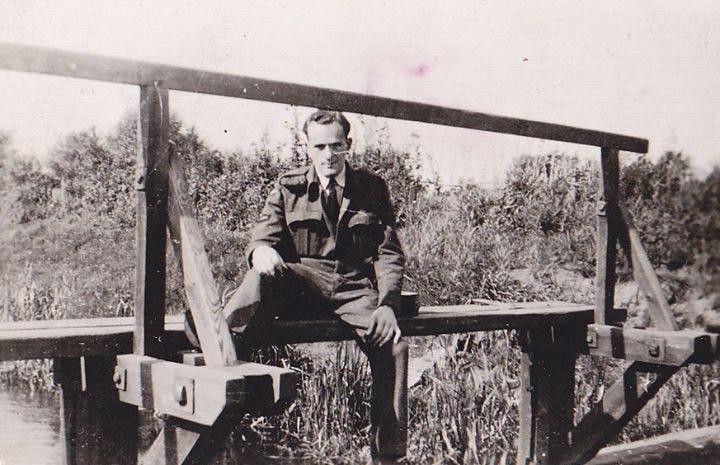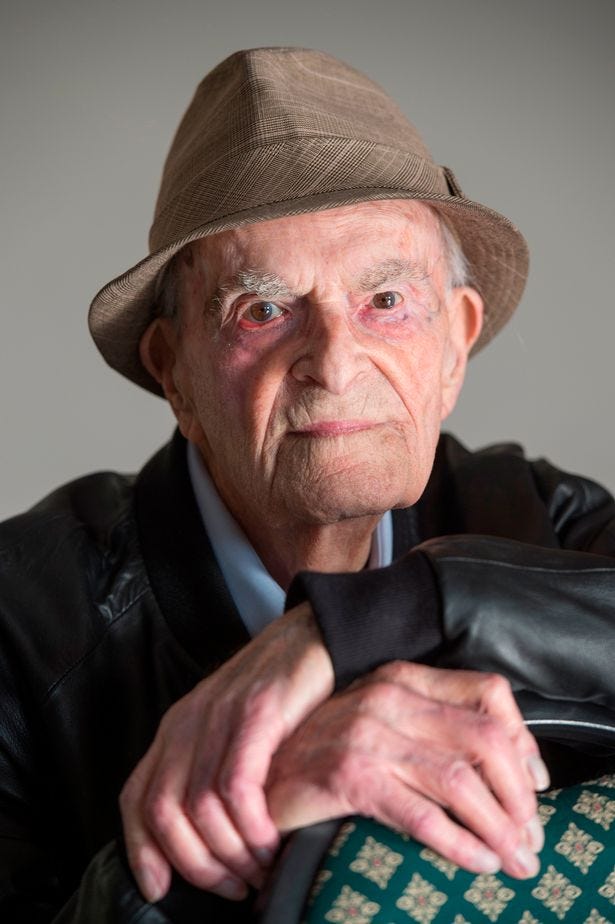Today, spring is breaking out across Europe as it did 80 years ago in 1945. But then, a world war was ending. Whereas now, war rages in Ukraine whilst a genocide against Palestinians is in its 3rd year in Gaza. Western society in the 21st century like Macbeth's hands, is drenched in blood. The stain of our sins against the innocent probably won't ever be washed clean from us.
Each year, my father loved the coming of spring. Much of that enjoyment came from recalling the spring he experienced in 1945 as a 22-year-old man serving in the RAF. After enduring so much hardship during the Great Depression, and then being in the war against Hitler, the spring of 1945 gave my Dad hope that peace was nearby and a socialist future possible.
Even when he was 90, he could not shake the joy and melancholy that the Spring of 1945 instilled in him as a young man. Below are his thoughts as an old man looking back to his younger self in 1945.
It rained today, as it does in April. The rain was not bitter with cold. It was just an unpleasant drizzle that made my morning walk uncomfortable. The dog, who dawdled beside me, seemed despondent by the spray that kept his fur moist and my raincoat damp. I sloshed across the pavement puddles on my way home to a warm cup of tea, lost in my thoughts and memories.
When I reached the school near my residence, I rested, breathless from my ninety years of life. I looked onto the pitch and saw boys with knees caked in turf and dirt practice rugby. I marvelled at their youth and their passionate pursuit of this one moment in time. My glasses were smeared with rain while the dog panted beside me, and I asked myself: how many Aprils remained for me?
I know not as many as I experienced as a boy and a young man. I no longer have an abundance of time. It's all behind me now.
I watched those boys at their sport, and I remembered a spring from my long-ago youth in 1945.
The war against Hitler was spiralling down to its end in a brutal dance of death. The young, old, vulnerable, and unlucky died in those last months of the war with the same indifference given to the flame on a match gutted by the wave of a wrist. During those last gasps of that terrible war, lives were lost and other times spared by fickle fate. In April 1945, I was twenty-two, a member of the RAF. I had experienced enough rough scrapes and near misses to last me a lifetime. But somehow, I believed I would come out of this war ok because birdsong was in the air, and the scent of lilac blooms told me this was a time for living and not dying.
During that final week of the war, when the month straddled the rain of April and the sun of May, Europe was slowly reborn.
I wasn't the only one who felt this because an American fighter pilot flying reconnaissance over the city of Hamburg also felt this on the morning of May 1st. On that day, he flew over the city. The pilot swung low over its botanical garden to destroy nazi defensive positions that were erected across the metropolis by the Wehrmacht to turn Hamburg into a death trap against allied soldiers slated to invade in the coming hours.
Below him were three young women who had come to the park to enjoy the early spring and avoid being rounded up to dig trenches in the city centre by rabid nazis who refused to accept the war was lost.
The young women heard the American fighter plane above, looked up and saw it rapidly descending as if to strafe them.
They had no place to run as the plane came down too fast. First, they were afraid, and then sadness overcame one of them when she thought "I won't live to see peace come".
But then the pilot realised they were young, non-combatants, that the war was nearing its end and that even animosity toward one's enemy has an expiration date soared over them. As he left them, the pilot tipped his wings to either indicate victory or perhaps peace and disappeared into the horizon.
Fate is so cruel, so random and sometimes so kind. You see, the woman who feared she would not live to see peace became my wife in 1947. I don't know what happened to the pilot. I hope his life after the war was pleasant and loving and that as an old man, he still struggles through the rain of April with the same gallantry he displayed in his youth.
Your support keeps me housed and allows me to preserve the legacy of Harry Leslie Smith. Your subscriptions are crucial to my personal survival because like so many others who struggle to keep afloat, my survival is a precarious daily undertaking. The fight to keep going was made worse- thanks to getting cancer along with lung disease and other comorbidities which makes life more difficult to combat in these cost-of-living crisis times. I promise the content is good, relevant and thoughtful. But if you can’t it is all good too because we are in the same boat. Take Care, John





You raise a good point John. How does a society (all of the white western world) live with what it has done these last couple of years? There are no longer any barriers, any laws, any rules that count. Do we descend into total barbarism? We didn’t learn from what the Nazis did, will the next generations learn from the evil displayed by Zionists? I’m becoming less hopeful about what will come of this but, nonetheless, the struggle must continue. Perhaps the youth will do better than our generations.
What a touching story and it sums up the futility of war. It reminds us that there is more uniting all of us than divides us and we must hang on to that!